This article is an orphan, as no other articles link to it . Please introduce links to this page from related articles ; try the Find link tool for suggestions. (March 2022) |
Notable people born in or near Metz (sorted by category):
Activism and politics
Adventure
Arts
Business
Literature and poetry
Military
|
Music
Religion
Sciences and knowledge
Sports
|
Notable people linked to Metz (sorted by chronology):
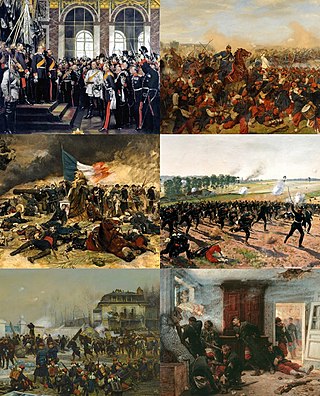
The Franco-Prussian War or Franco-German War, often referred to in France as the War of 1870, was a conflict between the Second French Empire and the North German Confederation led by the Kingdom of Prussia. Lasting from 19 July 1870 to 28 January 1871, the conflict was caused primarily by France's determination to reassert its dominant position in continental Europe, which appeared in question following the decisive Prussian victory over Austria in 1866. According to some historians, Prussian chancellor Otto von Bismarck deliberately provoked the French into declaring war on Prussia in order to induce four independent southern German states—Baden, Württemberg, Bavaria and Hesse-Darmstadt—to join the North German Confederation; other historians contend that Bismarck exploited the circumstances as they unfolded. All agree that Bismarck recognized the potential for new German alliances, given the situation as a whole.
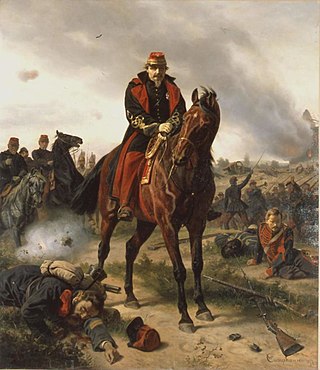
The Battle of Sedan was fought during the Franco-Prussian War from 1 to 2 September 1870. Resulting in the capture of Emperor Napoleon III and over a hundred thousand troops, it effectively decided the war in favour of Prussia and its allies, though fighting continued under a new French government.
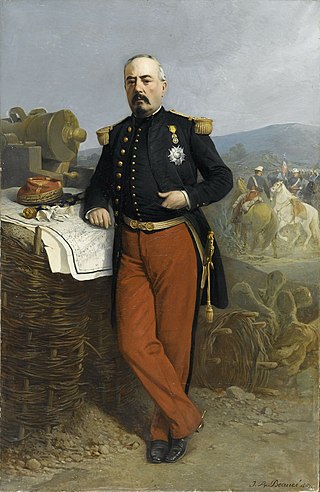
François Achille Bazaine was an officer of the French army. Rising from the ranks, during four decades of distinguished service under Louis-Philippe and then Napoleon III, he held every rank in the army from fusilier to Marshal of France, the latter in 1863.

The siege of Metz was a battle fought during the Franco-Prussian War from August 19 to October 27, 1870 and ended in a decisive Allied German victory.

The siege of Paris took place from 19 September 1870 to 28 January 1871 and ended in the capture of the city by forces of the various states of the North German Confederation, led by the Kingdom of Prussia. The siege was the culmination of the Franco-Prussian War, which saw the Second French Empire attempt to reassert its dominance over continental Europe by declaring war on the North German Confederation. The Prussian-dominated North German Confederation had recently emerged victorious in the Austro-Prussian War of 1866, which led to the questioning of France's status as the dominant power of continental Europe. With a declaration of war by the French parliament on 16 July 1870, Imperial France soon faced a series of defeats at German hands over the following months, leading to the Battle of Sedan, which, on 2 September 1870, saw a decisive defeat of French forces and the capture of the French emperor, Napoleon III.

The Three Bishoprics constituted a government of the Kingdom of France consisting of the dioceses of Metz, Verdun, and Toul within the Lorraine region. The three dioceses had been Prince-bishoprics of the Holy Roman Empire until they were seized by King Henry II of France between April and June 1552. At the end of the Thirty Years' War, they were officially ceded to France by the 1648 Peace of Westphalia.
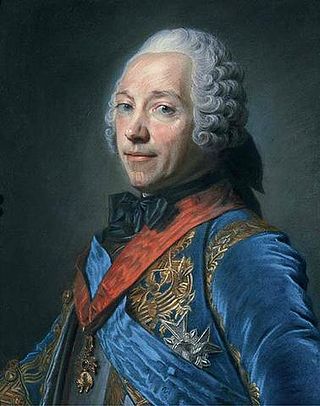
Charles Louis Auguste Fouquet, duc de Belle-Isle was a French general and statesman.

The Italian War of 1551–1559, sometimes known as the Habsburg–Valois War and the Last Italian War, began in 1551 when Henry II of France declared war against Holy Roman Emperor Charles V with the intent of recapturing parts of Italy and ensuring French, rather than Habsburg, domination of European affairs. The war ended following the signing of the Treaty of Cateau-Cambrésis between the monarchs of Spain, England and France in 1559. Historians have emphasized the importance of gunpowder technology, new styles of fortification to resist cannon fire, and the increased professionalization of the soldiers.

The Government of National Defense was the first government of the Third Republic of France from 4 September 1870 to 13 February 1871 during the Franco-Prussian War. It was formed after the proclamation of the Republic in Paris on 4 September, which in turn followed the surrender and capture of Emperor Napoleon III by the Prussians at the Battle of Sedan. The government, headed by General Louis Jules Trochu, was under Prussian siege in Paris. Breakouts were attempted twice, but met with disaster and rising dissatisfaction of the public. In late January the government, having further enraged the population of Paris by crushing a revolutionary uprising, surrendered to the Prussians. Two weeks later, it was replaced by the new government of Adolphe Thiers, which soon passed a variety of financial laws in an attempt to pay reparations and thus oblige the Prussians to leave France, leading to the outbreak of revolutions in French cities, and the ultimate creation of the Paris Commune.
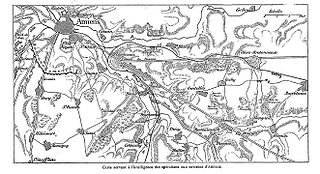
The Battle of Amiens, also known as the Battle of Villers-Bretonneux, was fought on 27 November 1870 between French and Prussian forces during the Franco-Prussian War (1870–1871). It ended in a Prussian victory, forcing the French to retreat and allowing the Prussians to capture Amiens, France.
Events from the year 1870 in France.

In the Battle of Guttstadt-Deppen on 5 and 6 June 1807, troops of the Russian Empire led by General Levin August, Count von Bennigsen attacked the First French Empire corps of Marshal Michel Ney. The Russians pressed back their opponents in an action that saw Ney fight a brilliant rearguard action with his heavily outnumbered forces. During the 6th, Ney successfully disengaged his troops and pulled back to the west side of the Pasłęka (Passarge) River. The action occurred during the War of the Fourth Coalition, part of the Napoleonic Wars. Dobre Miasto (Guttstadt) is on Route 51 about 20 kilometers (12 mi) southwest of Lidzbark Warmiński (Heilsberg) and 24 kilometers (15 mi) north of Olsztyn (Allenstein). The fighting occurred along Route 580 which runs southwest from Guttstadt to Kalisty (Deppen) on the Pasłęka.

Pierre François Joseph Durutte joined the French army at the beginning of the French Revolutionary Wars. Rapidly promoted for feats of bravery under fire at Jemappes in 1792 and Hondschoote in 1793, he found himself appointed to serve as a staff officer. He distinguished himself during the Anglo-Russian invasion of Holland in 1799 and received promotion to general officer. During the successful 1800 campaign he fought in Jean Victor Marie Moreau's army. Promoted again in 1803, his career then stalled because of his association with the banished Moreau and his unwillingness to see Napoleon Bonaparte as emperor.

The siege of Metz during the Italian War of 1551–59 lasted from October 1552 to January (1-5), 1553.
Metz, the capital and the prefecture of the Moselle department in France, has a recorded history dating back over 2,000 years. During this time, it was successively a Celtic oppidum, an important Gallo-Roman city, the Merovingian capital of the Austrasia kingdom, the birthplace of the Carolingian dynasty, a cradle of Gregorian chant, and one of the oldest republics of the common era in Europe. As an important city in the heart of Europe and the crossroads of different cultures, Metz has variously experienced an integration into the Roman Empire, the period of christianization, the barbarian depredations, religious wars, the French Revolution, the Industrial Revolution, an annexation into the German Empire, and World War II.

The siege of Metz was a siege of the French city of Metz during the War of the Sixth Coalition at the end of the Napoleonic Wars. It pitted French forces under General Pierre François Joseph Durutte against Prussian, Russian and Hessian troops commanded by the Russian General Dimitri Mikhailovich Youzefovitch. The allied force began the siege on 17 January 1814 and eventually lifted it on 10 April the same year, without having taken the city.

Wilhelm René de l'Homme de Courbière was a Prussian field marshal who served in several wars of the 18th century and during the Napoleonic Wars. Stemming from a French Huguenot family; he notably held the fortress of Graudenz against Napoleon's troops throughout 1807, long past the Peace of Tilsit, until the siege was finally lifted after 11 months.

The siege of Phalsbourg was an early battle of the Franco-Prussian War that was fought between the French Empire against Germany at Phalsbourg near the Vosges beginning on 10 August 1870, and ending on 12 December of the same year.
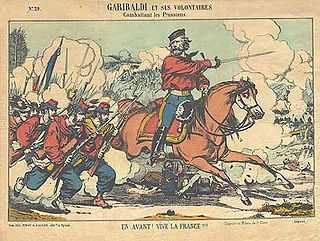
The Battles of Dijon were a series of battles that took place in 1870 and 1871, as part of the Franco-Prussian War, on the current territory of the French commune of Dijon between the French Republic and the German states of Prussia and Baden and later, the German Empire.
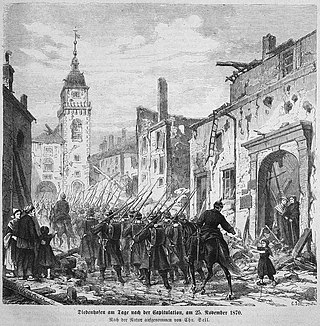
The siege of Thionville was a battle of the Franco-Prussian War which occurred in Thionville of the Moselle from November 13 to November 24, 1870. The small French garrison repulsed an attempted attack on August 14. It was subjected to a blockade and then besieged from November 13. After the capitulation of Metz, on October 28, 1870, the Prussians move part of their powerful artillery to Thionville. Bombed from November 22, the square surrendered on November 24. The capture of Thionville and that of Montmédy a month later gave the Germans control of the railroad to the Picardy front.